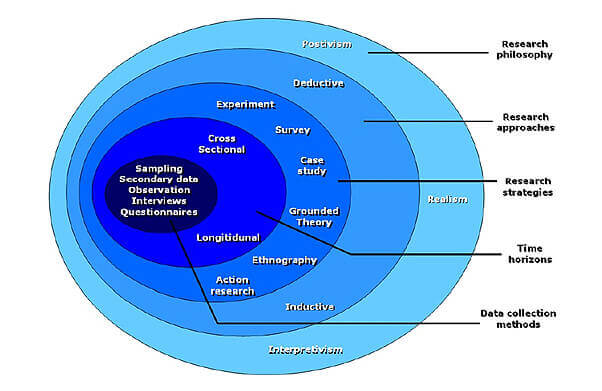Methodology
Chapter 3 - Research Methodology
3. 1. Research Process
According to Saunders, Lewis and Thornhill (2009), accomplishing the intended objectives necessitates carrying out a research through methodically gathering data and analysing them in order to discover phenomenon. Considering the research process, it is realised that defining the research strategy is necessary. For this purpose, Saunders Lewis and Thornhill (2009) bring forward the research process onion, which assists the researchers in illustrating the aspects that drive the selection of data collection methods. According to the scholars, the research process onion consists of five layers, which are the philosophy of the research, the approach of the research, the methodology of the research, time prospects and data gathering techniques (Saunders Lewis and Thornhill, 2009).

In developing the methodology of this research, the research process onion offered by Saunders, Lewis and Thornhill (2009) is utilised.
3. 2. Research Philosophies
Out of the many ways of explaining, theorising and categorising research methodologies, studying them on the basis of their philosophy is the most fundamental approach (Clarke, 1998). Philosophical approach towards studying research methodologies works with certain premises built on the most basic aspects of the world, for instance the mind, substance, reality, logic, truth, the nature of learning and how it is substantiated (Hughes 1994). Research philosophies are classified under three categories which are namely positivism, interpretivism and realism.
Positivist thought has a long history of evolution, rebuttals, reiteration and reassessment. The rationale behind positivist thinking is that there is an independent truth that is external to human actions and hence cannot be reduced to being a figment of human imagination. As per positivism, science is the way to reach the truth, to understand the world better to be able to predict and control it. The universe operates by the laws of cause and effect, is deterministic, and is different when we apply the scientific approach. Science is, therefore, broadly a mechanistic or mechanical affair in positivism. Methodical reasoning is used speculate and test theories. Based on the results of the tests we can see whether a theory fits the facts or not, if not then we revise the theory accordingly to predict reality more accurately (Easterby-Smith, Thorpe and Jackson, 2008). The positivists believe in empiricism, with observation and measurement being the centre of the scientific endeavour. Scientific methods main approach is the experiment, to recognize and understand laws through direct manipulation and observation (Trochim, 2000). On the other hand, approach has its own pre-defined limitations for research due to the structured research design requirement. According to the assumptions of the approach researchers may affect the approach by their own values or may be objective. In order to attain generalisations from the outcomes, large samples should be utilised considering the fact that one measurement would not be sufficient to comprehend the complex nature of the studied subject.
According to Hatch and Cunliffe (2006), the interpretivist/constructivist philosophy can be succinctly described as anti-positivist. Interpretivism can be generally described as an inductive or theory-building model. Interpretivists believe that there can be various realities (Denzin and Lincoln, 2003) and that all knowledge is ultimately related to, and influenced by, the person who has attained the knowledge. Therefore, interpretivists attempt to work collaboratively to understand and gain meaning from various points of view, and use this to form conclusions for their research projects (Hatch and Cunliffe, 2006).
Saunders, Lewis and Thornhill (2009) state that results from these types of studies tend not to be generalised, but are focused on understanding the meanings and points of view of individual subjects within their unique contexts. It is also important to study the thoughts and feelings of individuals, along with their verbal and non-verbal methods of communication (Easterby-Smith, Thorpe and Jackson, 2008). This type of study is considered more qualitative than quantitative due to the emphasis on language and the subjective type of data gathering that is used (Eriksson and Kovalainen, 2008). Researchers following this paradigm are particularly cautioned to carefully contemplate any bias that they may unintentionally introduce into the study due to its subjective nature, as well as the close interactions between researchers and their subjects.
The realist philosophy was created as an alternative to the extremes of positivism, which was considered too determined by the absolute control of natural laws, and constructivism, which was too relative and dependent on the individual circumstances. The realist philosophy proposes that there are indeed realities that are not related to or created by human awareness, but that understanding of information is influenced by society. Saunders, Lewis and Thornhill (2009) interpret this paradigm to mean that social conditioning creates an individual’s understanding of the world.





